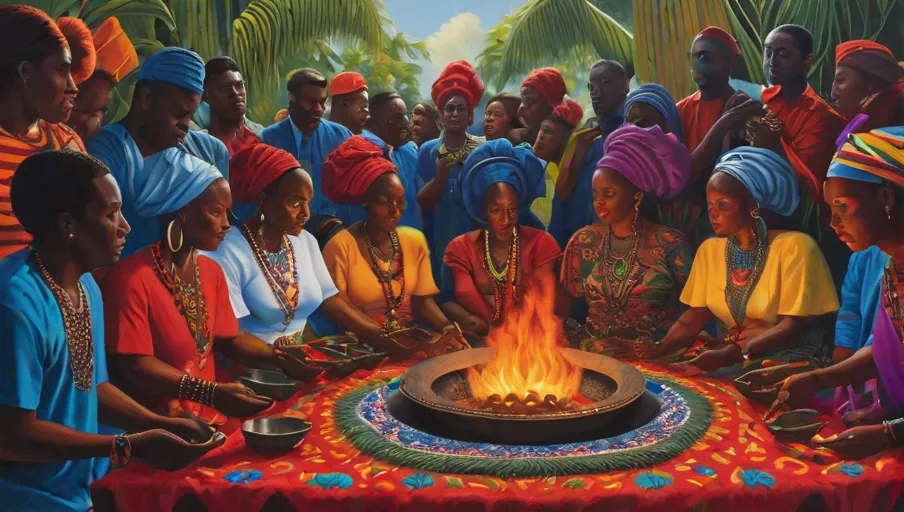Haiti’s Fèt Gede, observed on the Day of the Dead, is a vibrant and intriguing celebration that merges religious and cultural customs. This annual event, held in November, attracts a diverse crowd, including practitioners of Haitian Vodou and those fascinated by the festival.
The procession to cemeteries, led by individuals possessed by the Gede spirits, features lively language, provocative dancing, and elaborate performances. Beyond honoring the deceased, the festival embodies a profound philosophy of embracing life to the fullest.
With its blend of religious syncretism and a unique representation of the connection between the living and the dead in Vodou spirituality, Fèt Gede stands out as a distinctive and captivating observance that distinguishes it from other Day of the Dead traditions.
Overview of Fèt Gede

Fèt Gede is a unique celebration of life that takes place on the Day of the Dead in Haiti. This festival holds immense cultural significance as it blends Catholicism with Vodou spirituality, reflecting the religious syncretism in Haiti.
The procession to cemeteries is not only a symbolic gesture but also a practical act of cleaning and restoring tombs, emphasizing the festival’s deep-rooted connection to honoring the departed.
The symbolism and meaning behind Fèt Gede lie in its philosophy of embracing life as a carnival, where joy, laughter, and celebration are paramount. The Gede spirits, particularly Baron Samedi and Grann Brigitte, play a central role, representing the spirits of the dead in Vodou spirituality.
This celebration serves as a moment of communion between the living and the dead, where offerings of coffee, roasted corn, cassava, and rum are made to honor and remember those who have passed.
The Gede Spirits in Vodou Spirituality

The Gede spirits are significant entities in Vodou spirituality, serving as guardians of the dead and playing a central role in Haitian cultural practices.
Here are some key points about the Gede spirits:
-
Role of music in Gede spirit possession:
Music plays a crucial role in Gede spirit possession, as rhythmic drumming and lively songs are used to invoke and honor the Gede spirits during Vodou ceremonies. -
Symbolism and significance of Baron Samedi and Grann Brigitte in Vodou spirituality:
Baron Samedi, often depicted as a skeletal figure wearing a top hat and carrying a cane, is the head of the Gede family and governs the cemetery. Grann Brigitte, his wife, is associated with cemeteries, herbal medicine, and protection. They are both revered and feared for their powers over death and the afterlife.
These spirits bring joy, humor, and a sense of freedom to the living, embodying the philosophy of celebrating life even in the face of death.
The Spectacle of the Procession

Due to its fervent energy and intricate rituals, the procession unfolds as a vibrant and chaotic spectacle.
Costume and symbolism play a significant role in the procession, with participants donning ritual colors of Baron Samedi, such as white, black, and purple, and some even covering themselves with white powder or drawing gloomy scenes on their bodies.
Others opt for the preferred attire of Baron Samedi, complete with a black hat, monocle, and cane.
This visual display adds to the mystical and carnivalesque atmosphere of the event. Furthermore, music and dance are integral to the procession, with lively rhythms and spontaneous movements infusing the gathering with an infectious energy.
The combination of costume, symbolism, music, and dance creates a mesmerizing and unforgettable experience, showcasing the rich cultural tapestry of Fèt Gede.
Preparation and Rituals

Preparations for the festival involve cleaning the cemeteries and restoring the tombs. The process is not just about physical cleaning; it also involves spiritual cleansing rituals to honor the departed.
Symbolic offerings play a significant role in the preparations, symbolizing respect and remembrance for the deceased. These offerings include items such as coffee, roasted corn, cassava, and rum, which are brought to the graves as a way to show love and appreciation for the lives that were once lived.
The festival is a time to celebrate life and foster a connection between the living and the dead, emphasizing the idea that the departed are still present in our daily lives.
Religious Syncretism and Philosophy of Life

Representing the religious syncretism in Haiti, the Fèt Gede festival brings together Catholics, Protestants, and practitioners of Vodou in a unique celebration of life. This celebration embodies the philosophy of embracing joy and laughter, celebrating diversity, and living life to the fullest.
The festival serves as a testament to the harmonious coexistence of different religious beliefs and practices in Haiti.
It emphasizes the idea of living life like a carnival, where every moment is cherished and enjoyed. The participation of individuals from various faiths in Fèt Gede illustrates a philosophy of life that transcends religious boundaries, emphasizing unity and the shared human experience.



